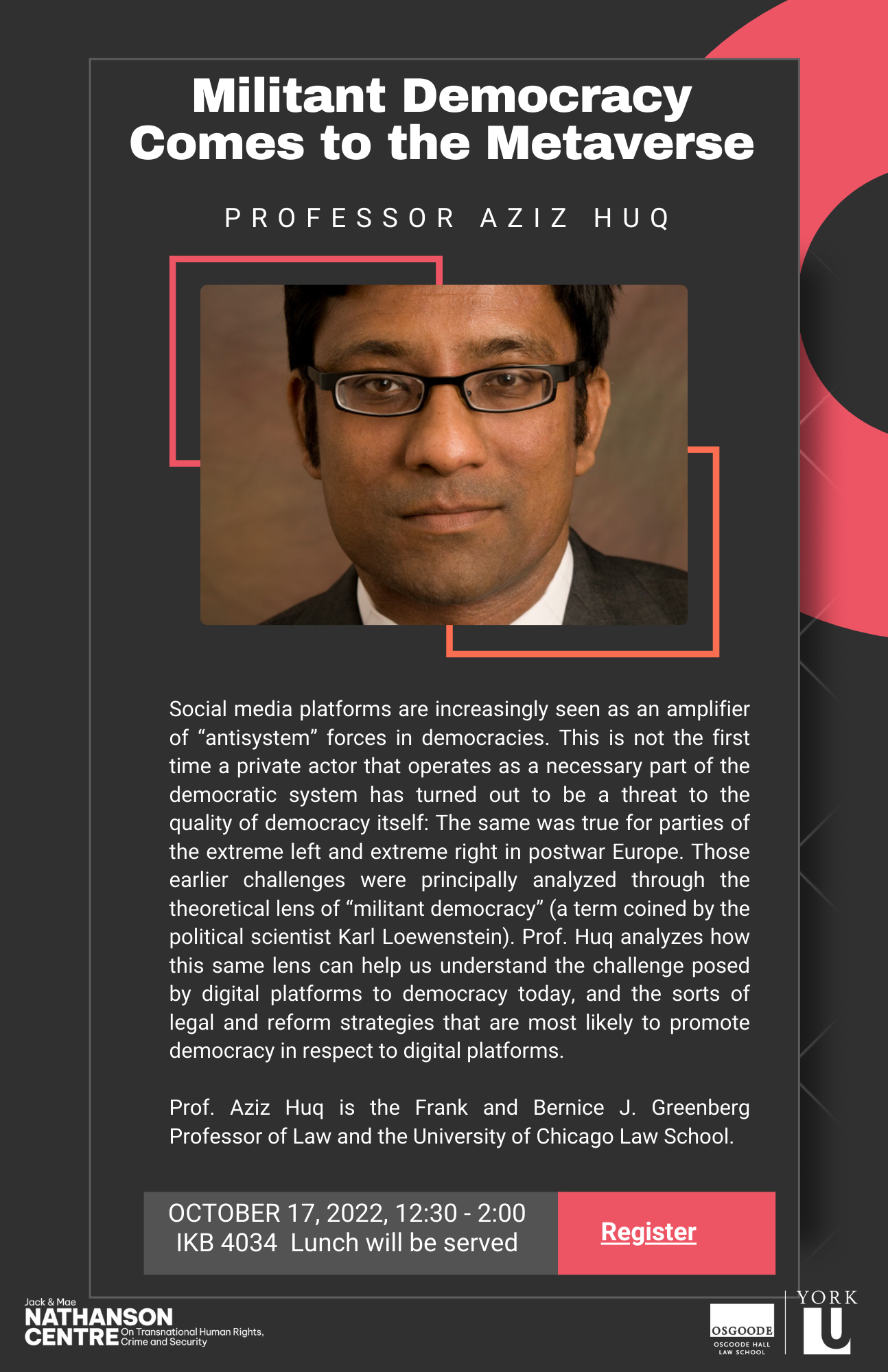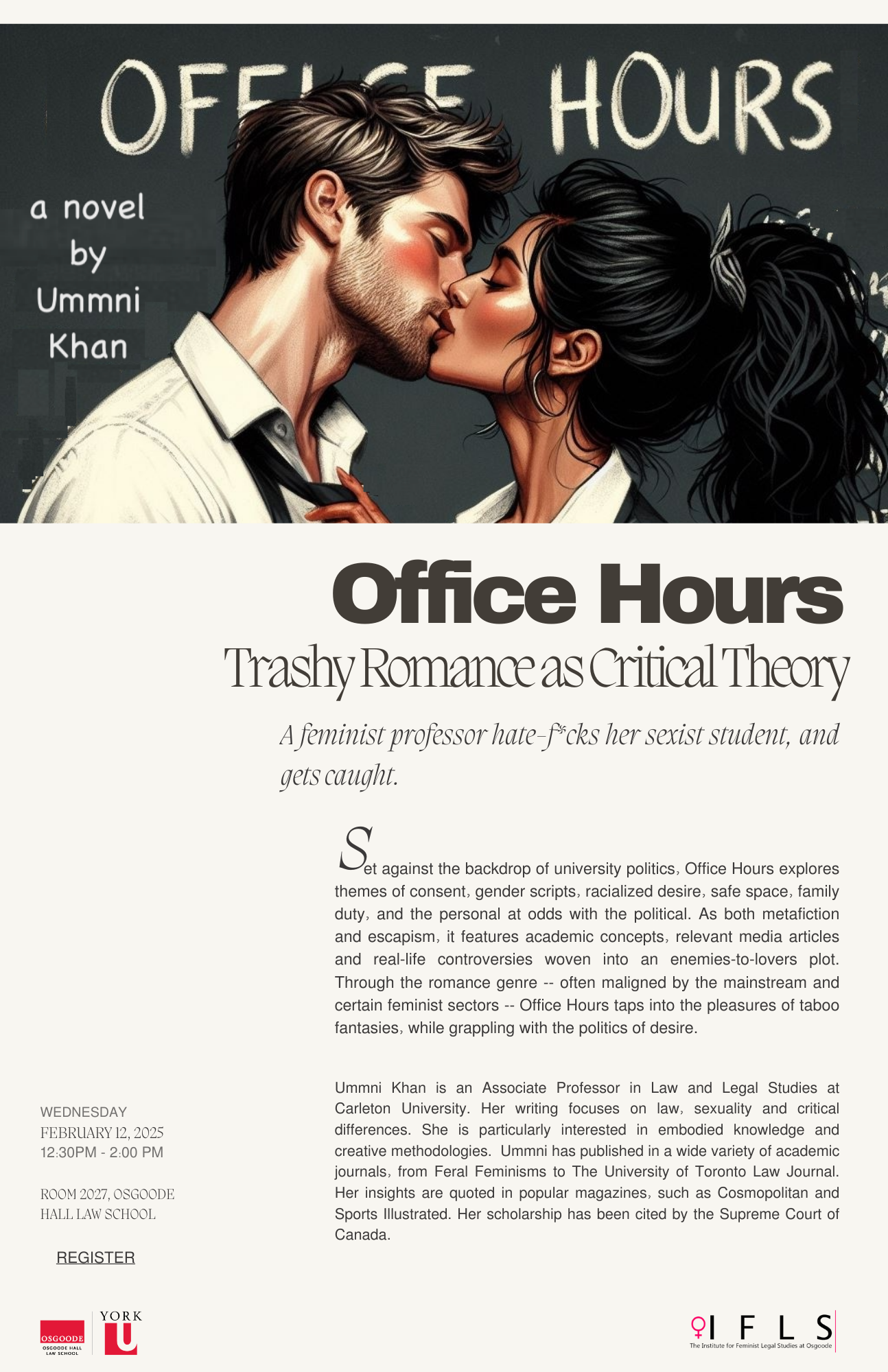
Office Hours
Trashy Romance as Critical Theory
A feminist professor hate-f*cks her sexist student, and gets caught.
The blurb: New professor Aamanee Haq is outraged by Xavier Thorn, an arrogant CEO attending her gender studies class solely for PR purposes. To make matters worse, he arouses not just her anger, but a deeply unwanted desire. Surely she can resist. Giving into his charms would mean betraying her feminist ethics and violating the University’s Sexual Misconduct policy — a policy she helped create.
Set against the backdrop of university politics, Office Hours explores themes of consent, gender scripts, racialized desire, safe space, family duty, and the personal at odds with the political. As both metafiction and escapism, it features academic concepts, relevant media articles and real-life controversies woven into an enemies-to-lovers plot. Through the romance genre — often maligned by the mainstream and certain feminist sectors — Office Hours taps into the pleasures of taboo fantasies, while grappling with the politics of desire.
Ummni Khan is an Associate Professor in Law and Legal Studies at Carleton University. Her writing focuses on law, sexuality and critical differences. She is particularly interested in embodied knowledge and creative methodologies. Ummni has published in a wide variety of academic journals, from Feral Feminisms to The University of Toronto Law Journal. Her insights are quoted in popular magazines, such as Cosmopolitan and Sports Illustrated. Her scholarship has been cited by the Supreme Court of Canada.
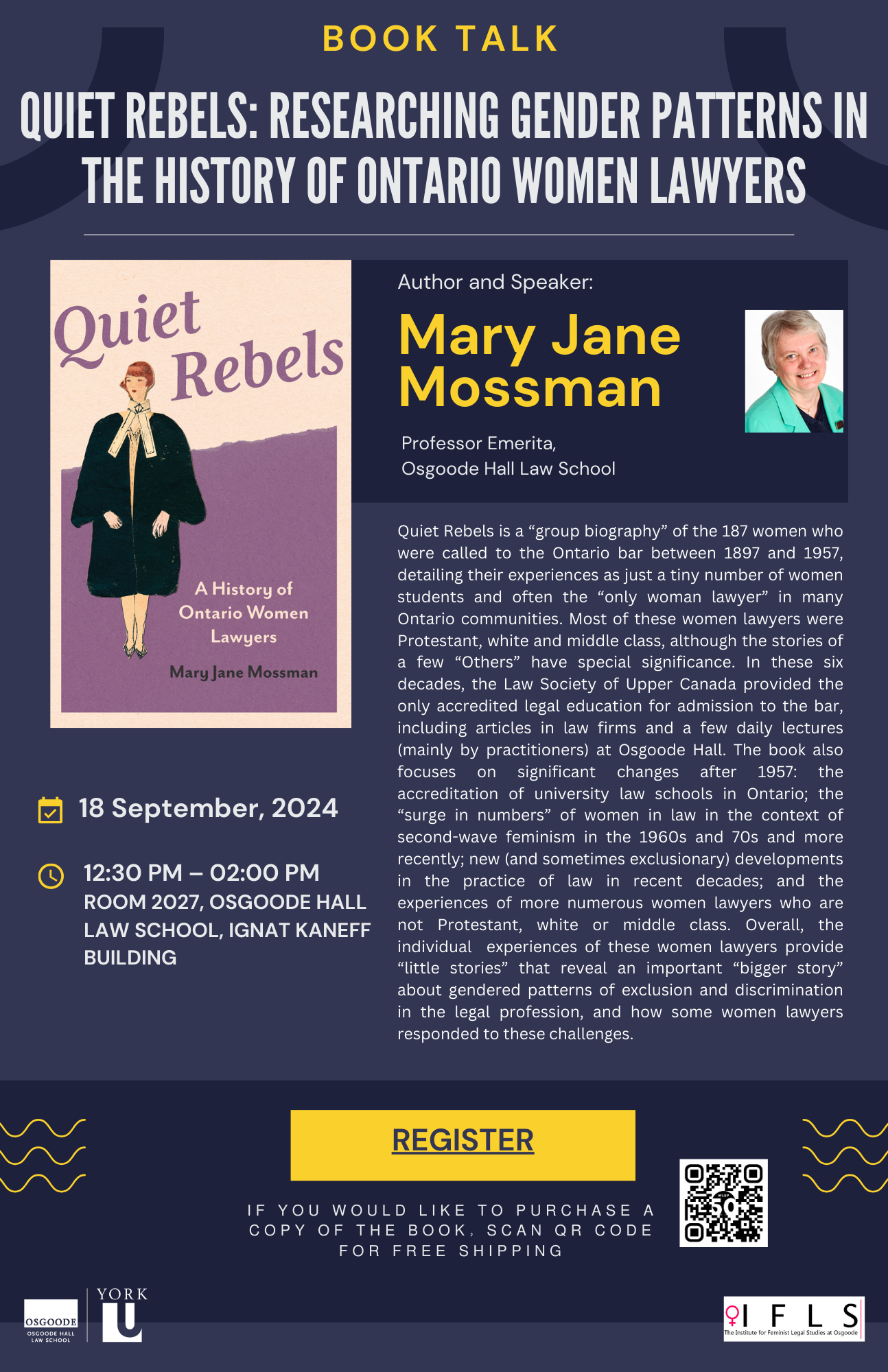
Abstract
Quiet Rebels is a “group biography” of the 187 women who were called to the Ontario bar between 1897 and 1957, detailing their experiences as just a tiny number of women students and often the “only woman lawyer” in many Ontario communities. Most of these women lawyers were Protestant, white and middle class, although the stories of a few “Others” have special significance. In these six decades, the Law Society of Upper Canada provided the only accredited legal education for admission to the bar, including articles in law firms and a few daily lectures (mainly by practitioners) at Osgoode Hall. The book also focuses on significant changes after 1957: the accreditation of university law schools in Ontario; the “surge in numbers” of women in law in the context of second-wave feminism in the 1960s and 70s and more recently; new (and sometimes exclusionary) developments in the practice of law in recent decades; and the experiences of more numerous women lawyers who are not Protestant, white or middle class. Overall, the individual biographies of these women lawyers provide “little stories” that reveal an important “bigger story” about gendered patterns of exclusion and discrimination in the legal profession, and how some women lawyers responded to these challenges.
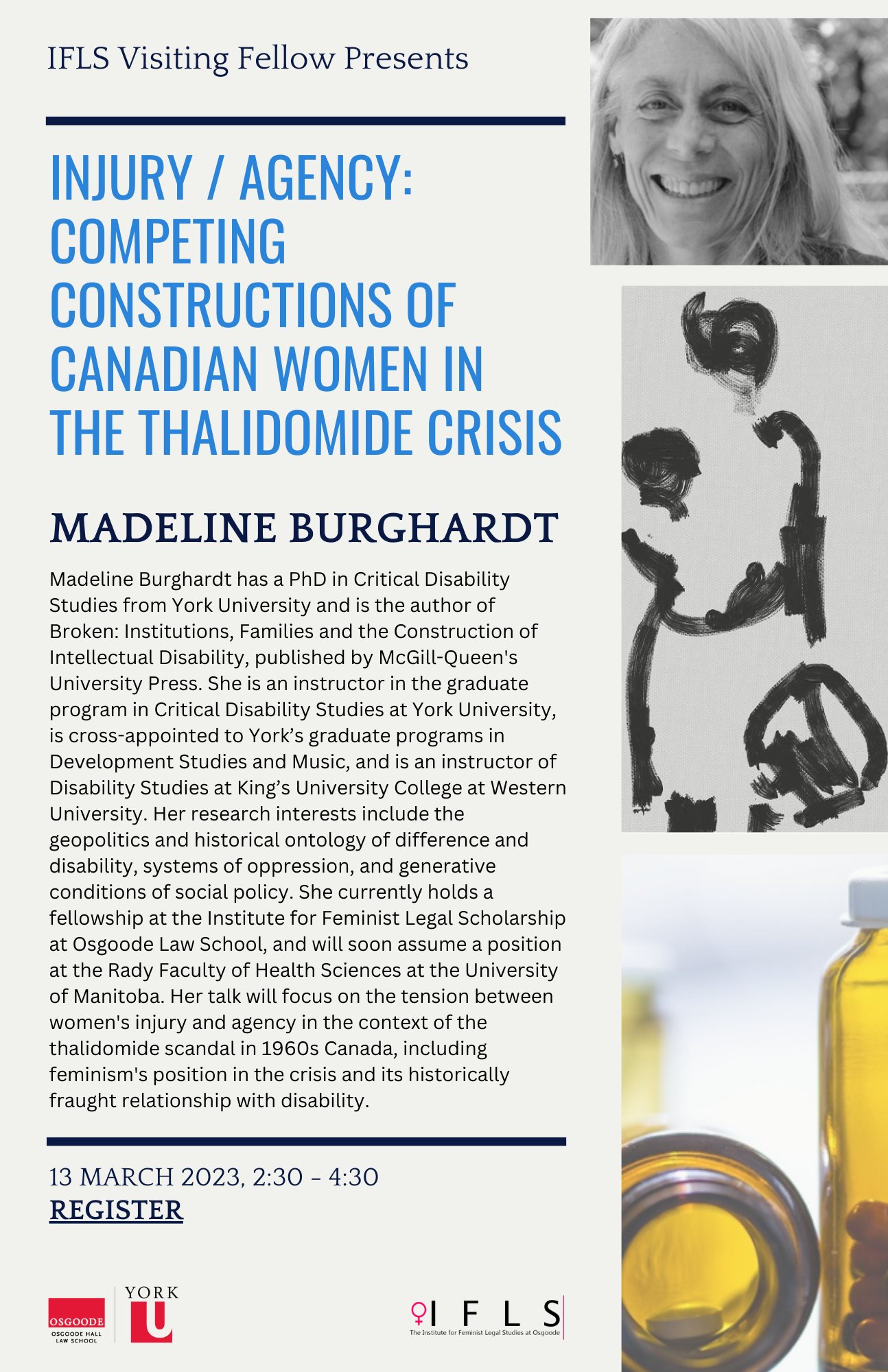
Madeline Burghardt has a PhD in Critical Disability Studies from York University and is the author of Broken: Institutions, Families and the Construction of Intellectual Disability, published by McGill-Queen’s University Press. She is an instructor in the graduate program in Critical Disability Studies at York University, is cross-appointed to York’s graduate programs in Development Studies and Music, and is an instructor of Disability Studies at King’s University College at Western University. Her research interests include the geopolitics and historical ontology of difference and disability, systems of oppression, and generative conditions of social policy. She currently holds a fellowship at the Institute for Feminist Legal Scholarship at Osgoode Law School, and will soon assume a position at the Rady Faculty of Health Sciences at the University of Manitoba. Her talk will focus on the tension between women’s injury and agency in the context of the thalidomide scandal in 1960s Canada, including feminism’s position in the crisis and its historically fraught relationship with disability.
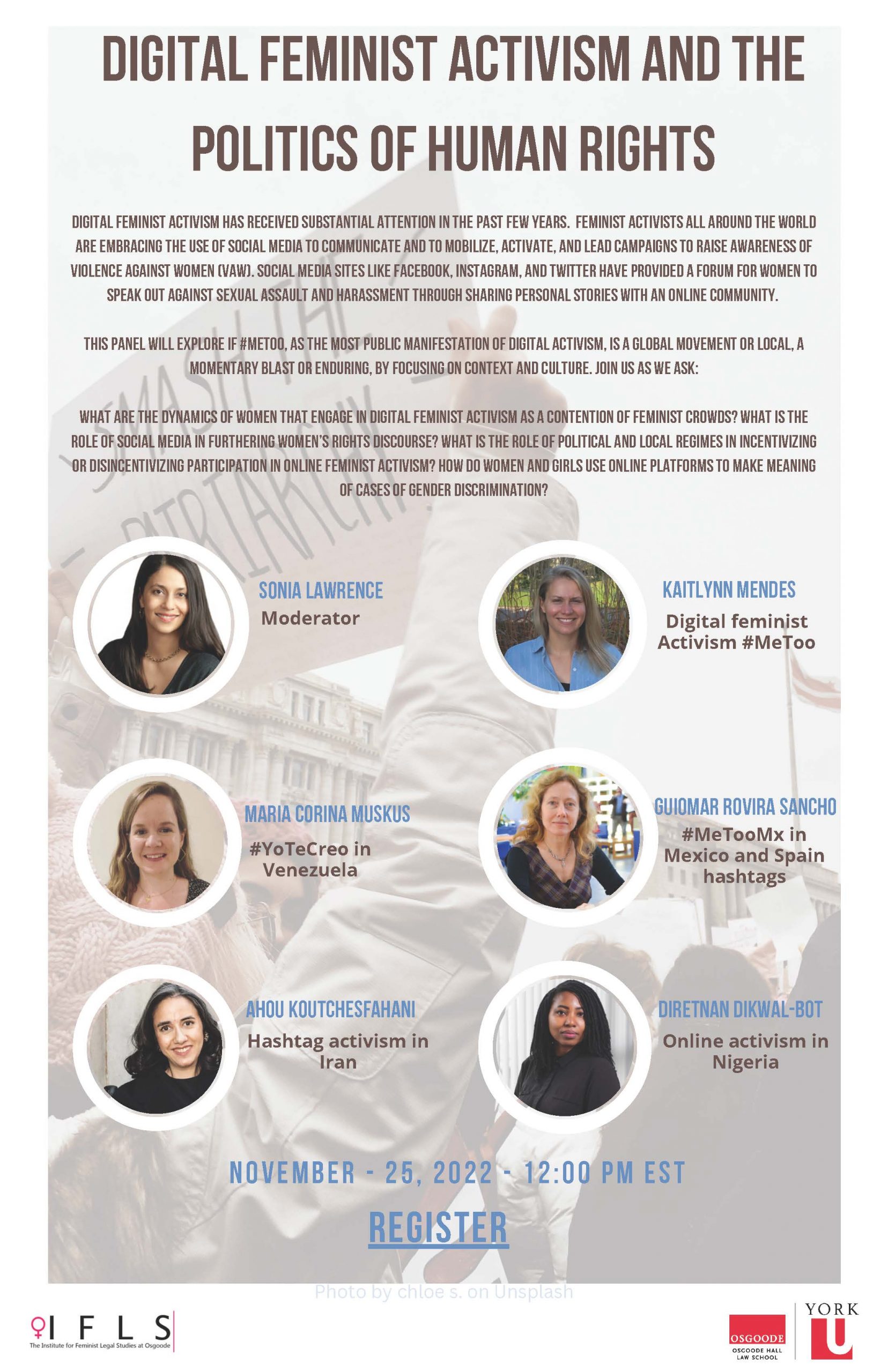
Abstract
Digital feminist activism has received substantial attention in the past few years. Feminist activists all around the world are embracing the use of social media to communicate and to mobilize, activate, and lead campaigns to raise awareness of violence against women (VAW). Social media sites like Facebook, Instagram, and Twitter have provided a forum for women to speak out against sexual assault and harassment through sharing personal stories with an online community.
This panel will explore if #MeToo, as the most public manifestation of digital activism, is a global movement or local, a momentary blast or enduring, by focusing on context and culture. Join us as we ask:
What are the dynamics of women that engage in digital feminist activism as a contention of feminist crowds? What is the role of social media in furthering women’s rights discourse? What is the role of political and local regimes in incentivizing or disincentivizing participation in online feminist activism? How do women and girls use online platforms to make meaning of cases of gender discrimination?
Moderator: Sonia Lawrence
Panel:
Kaitlynn Mendes – digital feminist activism #MeToo
Maria Corina Muskus – #YoTeCreo Venezuela
Guiomar Rovira Sancho – #MeTooMx in Mexico and Spain hashtags
Ahou Koutchesfahani- hashtag activism in Iran
Diretnan Dikwal Bot- online activism in Nigeria
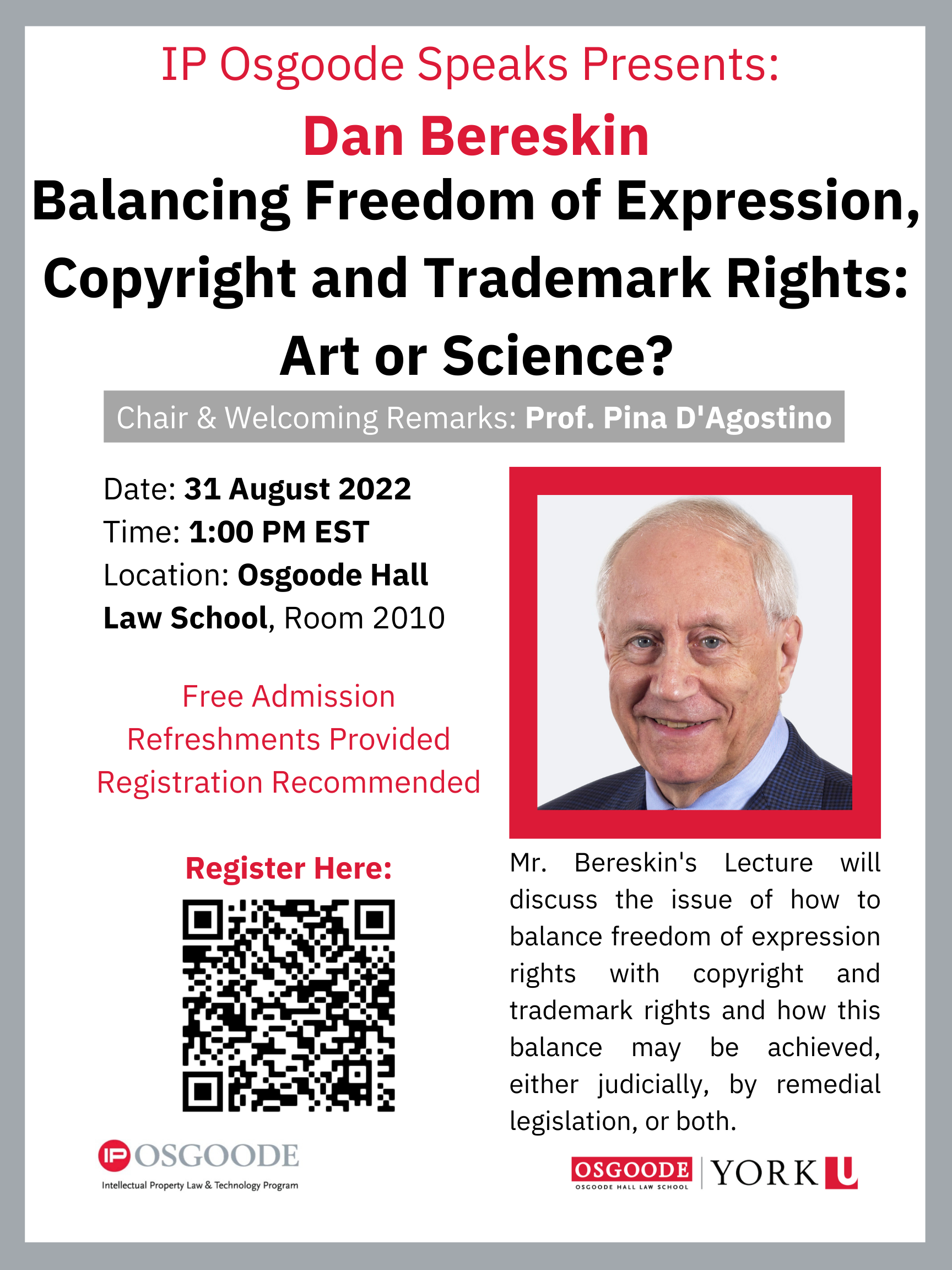
IP Osgoode invites you to join us for our first post-lockdown in-person event and first installment of the IP Osgoode Speaks Series since 2020. We are pleased to welcome Dan Bereskin to speak about “Balancing Freedom of Expression, Copyright and Trademark Rights: Art or Science?”
The scope of copyright and trademark rights has expanded judicially for decades. A direct consequence is court decisions that arguably impact adversely on freedom of expression guaranteed by the Charter of Rights and Freedoms. Such expansion has encouraged some copyright and trademark owners to become overly aggressive in enforcing their rights when the case for infringement is weak and damage to their rights is fanciful. This said, there are many wily thieves who repeatedly prey on such rights, and they deserve all the sanctions the law provides. The issue is how to balance these disparate rights. In this lecture, the author will discuss how such balance may be achieved, either judicially, by remedial legislation, or both.
The event will be held on 31 August 2022 at Osgoode Hall Law School, Room 2010, and will begin at 1:00 PM. Refreshments will be provided, admission is free, and registration is recommended (walk-ins are welcome but space is limited).
We hope to livestream the event on the Osgoode Hall Law School YouTube channel. The link will be available closer to the event.
Social media platforms are increasingly seen as an amplifier of “antisystem” forces in democracies. This is not the first time a private actor that operates as a necessary part of the democratic system has turned out to be a threat to the quality of democracy itself: The same was true for parties of the extreme left and extreme right in postwar Europe. Those earlier challenges were principally analyzed through the theoretical lens of “militant democracy” (a term coined by the political scientist Karl Loewenstein). Prof. Huq analyzes how this same lens can help us understand the challenge posed by digital platforms to democracy today, and the sorts of legal and reform strategies that are most likely to promote democracy in respect to digital platforms.
Prof. Aziz Huq is the Frank and Bernice J. Greenberg, Professor of Law and the University of Chicago Law School.





